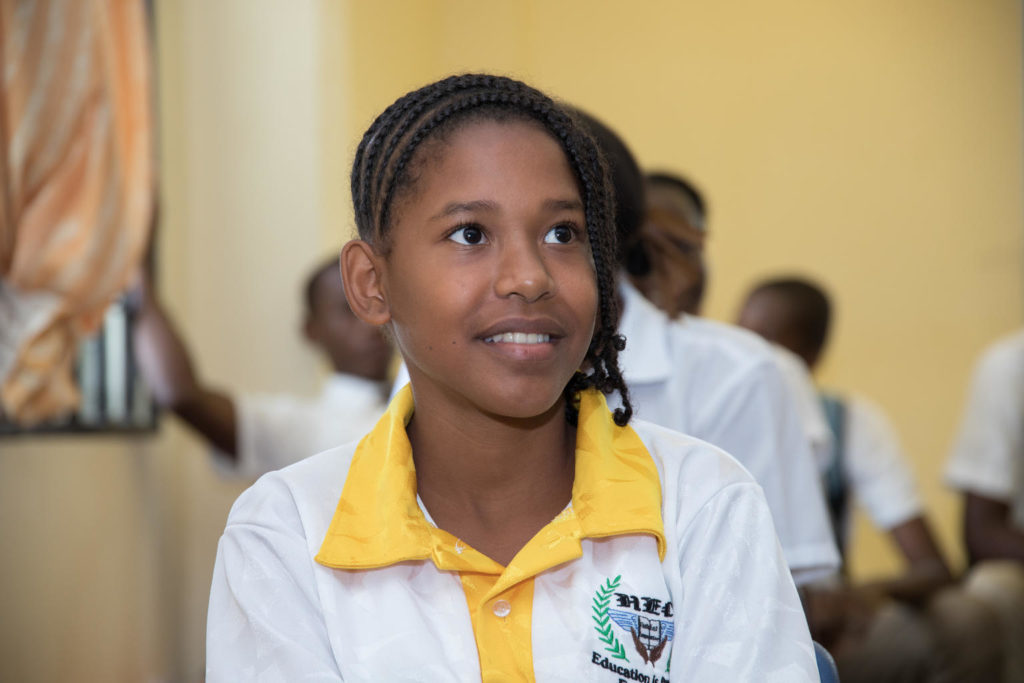Organisation of Eastern Caribbean States to partner with UNICEF-ITU global initiative Giga to enhance connectivity of schools and develop digital public goods
The Organisation of Eastern Caribbean States (OECS), the International Telecommunication Union (ITU) and the United Nations Children’s Fund (UNICEF) have signed an agreement to collaborate on Giga, a UNICEF-ITU global initiative to connect every school to the Internet and every young person to information, opportunity, and choice.
Launched in 2019, Giga sets the goal of providing connectivity to every school in the world. Some 3.6 billion people in the world are unable to access the Internet. A lack of access to the Internet means children and young people are excluded from the wealth of information available online, limiting their opportunities to learn and grow, and to fulfill their potential. Closing the digital divide requires global cooperation, leadership, and innovation in finance and technology.
“The OECS Commission is pleased to partner with UNICEF and ITU to deliver this timely digital transformation programme. The COVID-19 pandemic has made Giga even more relevant as we seek to bridge the digital divide and empower teachers, students and families to use technology to enhance the delivery of education and continuity of teaching and learning,” explains Dr. Didacus Jules, the OECS Commission’s Director General. “The successful delivery of Giga will be a major milestone for the OECS as there has been a clarion call across the OECS for improving digital inclusion, developing 21st century skills, and creating opportunities for children and young people to harness their innovative skills.”
As a first step, Giga is working with the OECS to map every school in the region, and to provide real-time monitoring data on the quality of internet connectivity.
“This agreement with the OECS Member states is integral to accelerating Giga. Eight countries in the OECS have completed mapping of their school connectivity and a Giga Regional Centre and team will soon be established,” noted Dr. Aloys Kamuragiye, Representative, UNICEF Eastern Caribbean. “Our collaboration has laid the groundwork and will continue our work together toward closing the digital divide in our region and offer opportunity and choice for every young person.”
“The ITU is excited that Giga is now a principal framework of the Member States of the OECS in achieving their Regional Education Strategy. An educated workforce contributes to the socioeconomic development of a country,” explains Doreen Bogdan-Martin, Director of the ITU Telecommunication Development Bureau. “Through Giga, we are delighted to partner with the OECS Secretariat, UNICEF and other key partners in industry to expand school connectivity in the Eastern Caribbean and, close the digital divide impacting rural and underserved areas. This improved connectivity will ensure that young people will be well equipped with the digital skills that they need to shape their futures in this Internet age.”
What is Giga?
By using schools to identify demand for connectivity, Giga serves as a platform to create the infrastructure necessary to provide digital connectivity to an entire country, for every community and citizen. The Giga initiative consists of four pillars: map connectivity of every school in partnership with governments, advise on building affordable and sustainable country specific models for finance and delivery, determine the best possible technical solutions to connect every school to the Internet, and empower young people with digital skills for the future.
Giga is aligned with the UN Secretary-General’s Roadmap for Digital Cooperation’s Recommendations 1A and 1B, which state, respectively, that by “2030, every adult should have affordable access to digital networks,” and have a “broad, multi-stakeholder alliance, involving the UN, create a platform for sharing digital public goods.”
Discover what others are saying on social media and join the conversation by following @Gigaglobal on Twitter and by searching and posting with the hashtag #GigaConnect
Notes for the Editors
About UNICEF
UNICEF works in some of the world’s toughest places, to reach the world’s most disadvantaged children. Across 190 countries and territories, we work for every child, to build a better world for everyone. For more information about UNICEF and its work for children visit www.unicef.org, www.unicef.org/easterncaribbean.
About ITU
The International Telecommunication Union (ITU) is the specialized United Nations agency for information and communication technologies (ICTs), driving innovation in ICTs together with 193 Member States and a membership of nearly 900 companies, universities, and international and regional organizations. Established over 150 years ago in 1865, ITU is the intergovernmental body responsible for coordinating the shared global use of the radio spectrum, promoting international cooperation in assigning satellite orbits, improving communication infrastructure in the developing world, and establishing the worldwide standards that foster seamless interconnection of a vast range of communications systems. From broadband networks to cutting-edge wireless technologies, aeronautical and maritime navigation, radio astronomy, oceanographic and satellite-based earth monitoring as well as converging fixed-mobile phone, Internet and broadcasting technologies, ITU is committed to connecting the world. For more information, visit www.itu.int.
About OECS
The Organisation of Eastern Caribbean States (OECS) is an Inter-governmental Organisation dedicated to regional integration across eleven member countries in the Eastern Caribbean. The OECS Commission, guided by the Revised Treaty of Basseterre, strategic objectives, works across its programmatic areas and in all Member States to consolidate the single economic space for enhanced economic growth, social inclusion and environmental protection.

